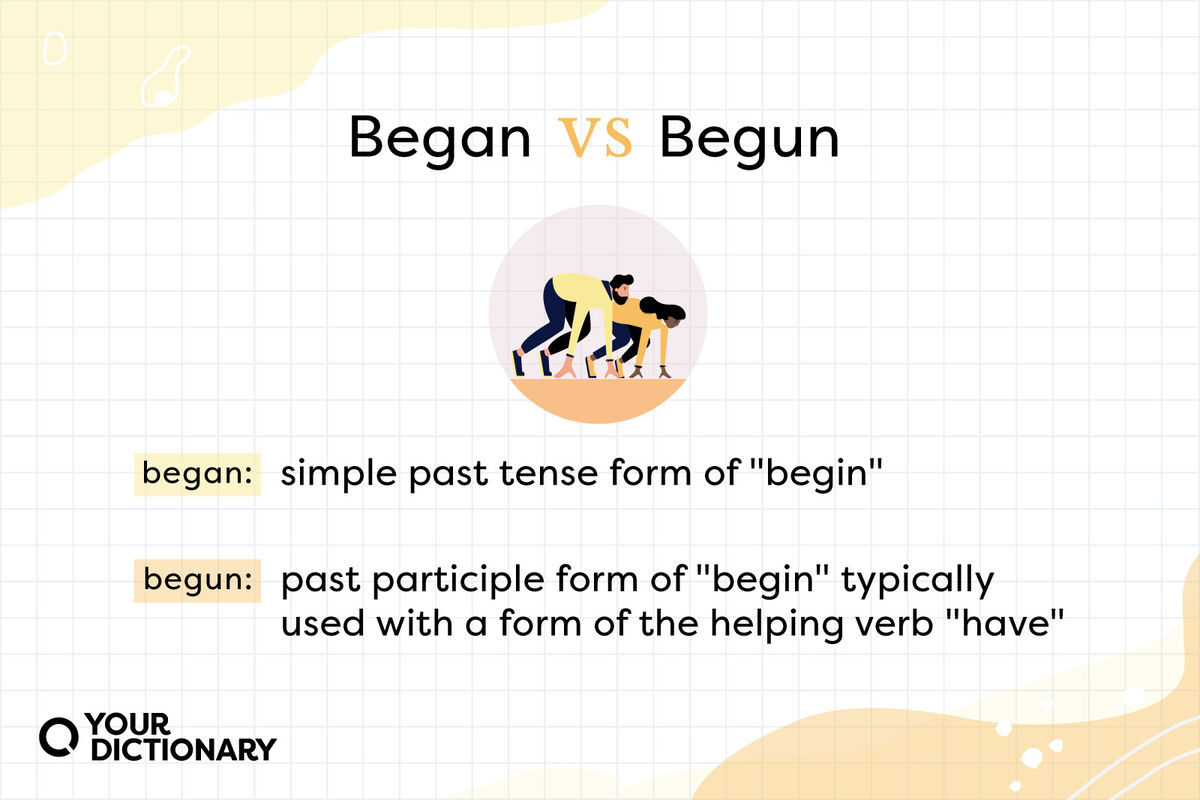
Learn how to use began and begun correctly in a sentence. See a clear breakdown of how usage is different for these words through examples. Get tips for when to use began vs. begun.
Begun or Began: It All Starts With Begin
The begun or began debate all starts with one simple word: begin. Both begun and began are past forms of the irregular verb begin. However, when you use these past tense forms of begin will depend on your sentence.
- Began is the past tense form of begin and is used in a simple past tense sentence.
- Begun is the past participle of begin and is typically used with a form of the helping verb have.
Check out this quick and easy-to-reference chart showing you the differences between began and begun before diving into each term in depth.
|
Began |
Begun |
|
|
Definition: |
to start or undergo |
to start or perform |
|
Relationship to begin: |
past tense |
past participle |
|
Helping verb: |
no |
yes, have |
|
Example sentence: |
She began her presentation with a slideshow on Obama. |
The baby had begun to develop on target after changing formulas. |
When to Use Began: Past Tense
When it comes to using began in a sentence, it comes to play when you are trying to convey past tense for the word begin. Since begin is an irregular verb, rather than adding -ed to the end, the word changes to began. For example, you wouldn’t say, “I beginned reading this book a few months ago.” Instead, you would say, “I began reading this book a few months ago.” It’s included in a simple past tense sentence that doesn’t need a helping verb like have, can, must, or may. To see how you use began, see a few sample sentences with began at play.
- Her night began at home.
- I began reading this novel about three days ago.
- The baby began to cry when his mom left the room.
- She began the race with a quick pace but soon fell off.
- We don’t know why the boy suddenly began to cry.
- After the vaccine, the number of illnesses began to go down.
- The virus began to spread quickly once they were exposed.
- The audience began to clap as she played her last note.
- I began writing this story a few years ago.
- The minute I ran out of the house, it began to rain.
When to Use Begun: Past Participle
Now, it’s time to take a look at begun. Begun is the past participle of begin. But what does that really mean? You use a past participle with perfect tenses when talking about something that happened at some point or is still continuing. Additionally, begun needs a helper in the sentence, so it’s always used with a form of the helping word have. Watch how begun is used in a sentence.
- Have you begun your dishes?
- The race had already begun when he realized he hadn’t grabbed his baton.
- I have begun to read a few hours every night.
- The storm stopped as quickly as it had begun.
- She had begun to eat the spaghetti.
- He had begun to sniffle after catching a cold.
- The thunder had begun after the lighting.
- The race had begun.
- The fight had already begun by the time we got to our seats.
- The opera will have begun after we get through this traffic.
Quick Tips for Knowing When to Use Begun vs. Began
It can be hard to know whether you should use the word began or begun. However, there are a few quick tips you can think of.
- Begun always has a helper.
- Began is used for an event that ended.
Began vs. Begun: That’s the Question
While the great began vs. begun debate might not be a Shakespearean level question, it’s a confusing grammar point all the same. Now that you know the tricks, these two words shouldn’t trip you up. Continue your time word journey by exploring the use of continual vs. continuous. Then, explore other confusing past tense verbs like hanged vs. hung. Learn more fun grammar problems by exploring at and in for time and place.